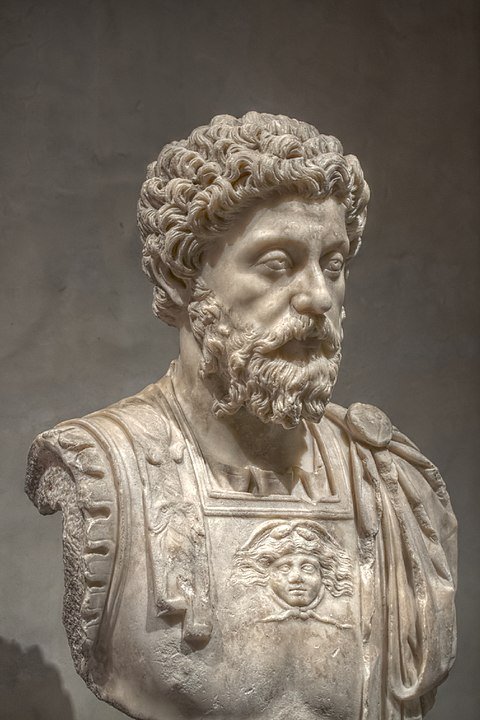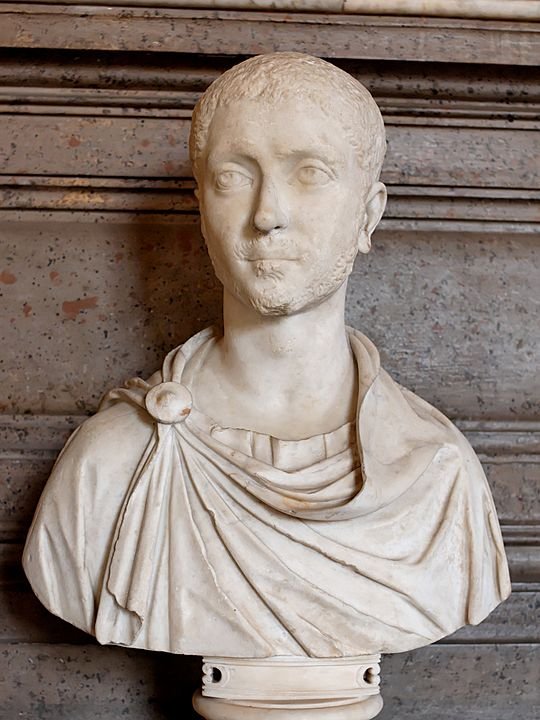When it comes to manifestations of power, one of the most widely recognized images, at least in the Western World, is that of the Roman emperor. The word Caesar, originally just being a Latin nickname for a person with bushy hair, became the title for the person(s) wielding supreme authority in the most powerful empire of the ancient world. Other imperial titles such as the German Kaiser, and the Russian Tzar can trace their etymological roots back to that original Roman title. While the role of the Roman emperor built on traditions from the proto-democratic Roman republic and was therefore an altogether different institution than a typical ancient despot, Roman emperors did always did control significant military power and resources, and in today’s blog post I will juxtapose two Roman emperors – one famous and one relatively unknown – and comment on what happens when the reins of power are given not to the proud, the impulsive or the headstrong, but to the nerd.
Marcus Aurelius
When it comes to naming the best Roman emperors, the list will change somewhat depending on your choice of scholar, but the name Marcus Aurelius will almost always appear in any top 5 list and in most top 3 lists as well, and his consistently high rankings are well-deserved. Being a scholarly, conscientious and introspective man, he was the first, and perhaps only true philosopher-emperor Rome ever produced. He took time out of his busy schedule as military commander during his unending campaigns defending the borders of the Empire throughout his reign to pen his famous philosophical diary on how to live a virtuous life (His so-called ‘meditations’). He also exhibited an exceedingly rare insight into the dangers of concentrating power when he, at the time of his elevation to Emperor in 161 AD, chose to rule not as sole Augustus, but only as co-emperor with his younger adoptive brother Lucius Verus until the latter’s death eight years later.

Bust of Marcus Aurelius - picture from Wikipedia
While the young Marcus Aurelius was positioned to eventually don the purple by the late emperor Hadrian, his lack of experience in the fields of military, and provincial governance as well as his general disinterest in politics did make his early reign subject to a lot of uncertainty. Furthermore, foreign powers tried to exploit the perceived weakness of a Roman empire in the middle of a power transition. The young Marcus Aurelius, however, proved to excel in all the fields required of a capable emperor, and managed to both strengthen the imperial administration and successfully defend the borders of the Roman empire. He also stood out as one of the most prudent and conscientiously just emperors when it came to matters of law. Marcus Aurelius died in 180 AD from natural causes leaving the imperial throne to his son, and then co-emperor Commodus.
Alexander Severus
While Marcus Aurelius is one of the most celebrated emperors throughout history, the later reign of emperor Alexander Severus is one relegated to relative historical obscurity, despite his not insignificant achievements. Alexander was crowned Emperor at the mere age of fourteen by a cheering Pretorian Guard after murdering the current emperor, his cousin Elagabalus at his feet. Like the personalities of the serious-minded bookworm Marcus Aurelius and his fun-loving, chariot race aficionado step-brother Lucius Verus, the young Alexander was a serious and even-tempered boy, who stood in stark contrast to his cousin, the spoiled, impulsive and extravagant Egalabalus, whose incessantly scandalous behavior led to his eventual assassination. Due to his young age, his mother Julia Mamaea initially set down a council of Roman senators, which included both the historian Cassius Dio and the famous jurist Ulpian to aid the young emperor both in decisions in the matters of state but also aid in the young emperor’s education. With the aid of both his mother and the aforementioned council, the first nine years of Alexander’s reign was a welcome period of peace and stability in an otherwise unstable period of Roman history and included many domestic achievements, such as the rolling back of Elagabalus’ wildly unpopular religious reforms, the increased focus on corruption within the imperial administration and general tax reductions. However, with the war against the invading Sassanid empire under king Ardashir I in 231 AD, the cracks in Alexander’s administration began to show. The campaign saw some initial success, but after Alexander failed to make the finishing move against the Sessanids in the three-pronged maneuver against the Sessanid army, Ardashir was able to wipe out much of the opposing Roman army almost to a man while suffering little casualties. This perceived cowardice on the emperor’s part coupled with with the seasoned soldiers’s unhappiness with being commanded by not just a boy, but a boy controlled by his mother, led to a breakdown in discipline and large scale desertions and mutinies among the Syrian legions. Luckily for Alexander, the Sessanid army was not a professional fighting force, but an army drafted from farmers and craftsmen, and after only two years of campaigning, Ardashir was forced to disband his army as his soldiers had to return home to attend to their farms and businesses, meaning that Alexander could write off his rather disastrous first military campaign in Syria as a victory. However, already in 234 AD, war broke out at the other end of the empire, as Germanic tribes started to invade Roman territory in the Danube and Rhine regions. Alexander marched his legions to confront the invading tribes, but rather than initiating a military campaign to crush the invaders, Alexander started negotiations with the chieftains of the tribes in an attempt to buy them off in order to curb the invasions. This was the final straw for the legions, who had had enough of their weakling emperor and promptly elevated the popular general Maximinus Thrax to Caesar and had Alexander, his mother, and his advisors murdered in their camp on the same day.

Bust of Alexander Severus - picture from Wikipedia
Reflections
After reading through the biographies of Marcus Aurelius and Alexander Severus, one of the most pressing questions that come to mind is what accounts for the wildly different fates of these two nerds-turned-emperors. It is easy to blame Alexander’s hardships on just being dealt a bad hand, where he suddenly had to take the reins in the wake of one of the worst emperors in Roman history and had to contend with numerous foreign aggressors and internal power politics, but Marcus Aurelius’ reign was certainly not lacking in hardships both in terms of foreign aggressors, internal revolts and even the Antonine plague scything through the Empire during his reign. From my perspective, one of the most significant differences is the level of preparedness that each emperor had attained at the time of ascension, both in terms of training and personal maturity. Marcus Aurelius had been groomed for leadership throughout most of his life, had held several political offices including the office of consul, and worked closely with his predecessor, the emperor Antonius Pius for several years prior to ascending the throne. More importantly, Marcus Aurelius was 39 years old when he donned the purple, where Alexander Severus was only 14, the second-youngest man to be crowned Roman Emperor ever, and while his mother and his ever-scheming grandmother Julia Maesa certainly were plotting against Elagabalus during the end of his reign and might have worked surreptitiously to prepare the young Alexander for the role as emperor, such training could have lasted only two years at most and was of no comparison to the formal training that Marcus Aurelius received through his many political offices and many years of work at the court of Antonius Pius. This lack of maturity probably accounted for Alexander’s inability to commandeer respect with the legions and his inability to free himself from the suffocating yolk of advisors, and more importantly, his domineering mother, which was a decisive factor in his unpopularity with the army, that led to his untimely demise.
The lives of both Marcus Aurelius and Alexander Severus should give any intelligent but nerdy young man, who have fantasised about how much better it would be if he was in charge, a reason to pause and reflect on what skill set is really needed to become a good leader and also secure a peaceful transition of power to a capable heir. Both marked an end to an era in Roman history: The end of the Era of The Five Good Emperors in the case of the former, and the end of the Severan dynasty and the beginning of the Crisis Of The Third Century in case of the latter. While Marcus Aurelius’ legacy is certainly impressive, he was far from perfect and the legacy of his son, the infamous emperor Commodus, who inherited the throne upon his father’s death is almost the direct inverse of that of his father. While Alexander Severus’ domestic achievements are impressive given his young age, it became very clear that once a military commander was needed to defend the empire, the young Alexander fell disastrously short.
Thank you so much for reading! Please leave a like and follow me if you like my writing. If you share my interest in the history of the Roman empire, I can really recommend Mike Duncan’s excellent podcast The History Of Rome and if you are interested in learning more about just what it was Marcus Aurelius was scribbling on in his tent at night during those long military campaigns, the Youtube channel Vox Stoica has narrated Marcus Aurelius’ meditations in its entirety